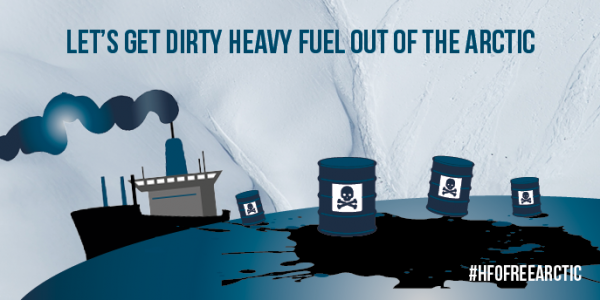The EU Parliament adopted the Resolution on international ocean governance, and in particular its commitment towards ending the use of heavy fuel oil and its carriage in fuel tanks in Arctic shipping. A development most welcomed by the Clean Arctic Alliance.
In response to the passing of the resolution by the EU Parliament, on international ocean governance in the context of the 2030 Sustainable Development Goals, Dr. Sian Prior, lead advisor to the Clean Arctic Alliance, said: “The Clean Arctic Alliance welcomes the adoption of the European Parliament Resolution on international ocean governance, and in particular its commitment towards ending the use of heavy fuel oil and its carriage in fuel tanks in Arctic shipping. The EU parliament’s position is further evidence that heavy fuel oil use in the Arctic is no longer acceptable – its presence in the Antarctic has been prohibited for some years, and last year the International Maritime Organization began moves towards its phase out. It is now imperative that the risks associated with burning HFO and carrying HFO fuel are eliminated in the Arctic.”.
Figures from 2015 show that 44% of vessels sailing in the Arctic were using heavy fuel oil (HFO), however, because mostly larger vessels are using HFO, around 75% of the marine fuel currently carried as bunkers in the Arctic is HFO.
“The decision by the IMO last summer to start a new work process to address HFO risks to the Arctic was a good step in the right direction. But the success of this process will be judged by its speedy outcome. The collision and ensuing environmental disaster in the East China Sea in the past two weeks is yet another reminder that ships are not immune against accidents,” said Faig Abbasov, shipping officer at Transport & Environment, member of Clean Arctic Alliance.

The Clean Arctic Alliance noted that the risks posed by the use of HFO in Arctic maritime transport are multiple:
- In the event of spills, the highly dense fuel emulsifies, sinks and can travel extremely long distances if it gets trapped in ice.
- Spilled HFO poses enormous risks to the food security of Arctic indigenous communities, whose subsistence depends on fishing and hunting.
- Combustion of HFO produces sulphur oxides and heavy metals, as well as large amounts of black carbon, which, when deposited on Arctic ice, stimulates the absorption of heat into the ice mass, accelerating the melting process and the effects of climate change;
- The transport and use of HFO is prohibited by the IMO in the waters surrounding the Antarctic.































































